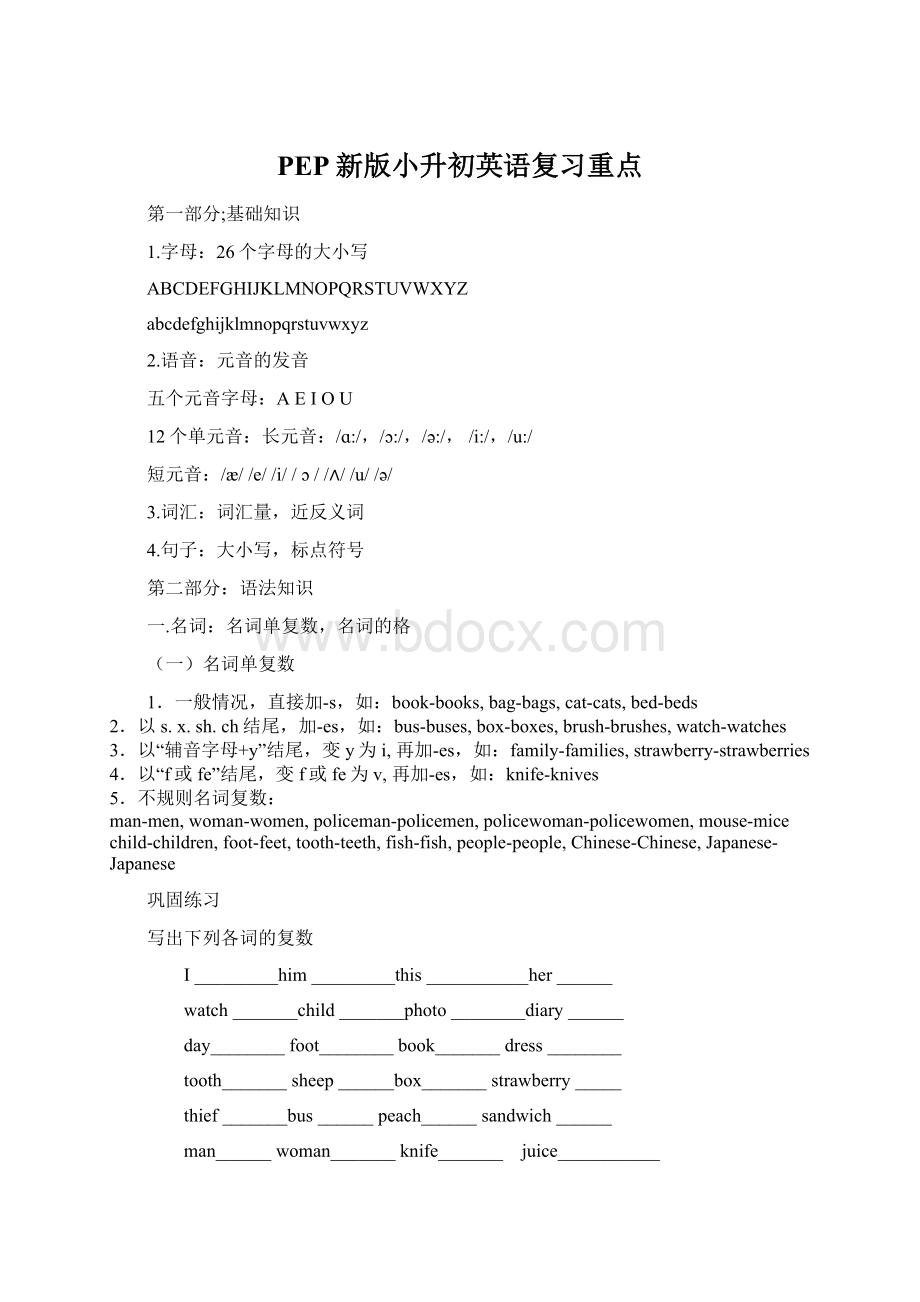PEP新版小升初英语复习重点Word格式文档下载.docx
《PEP新版小升初英语复习重点Word格式文档下载.docx》由会员分享,可在线阅读,更多相关《PEP新版小升初英语复习重点Word格式文档下载.docx(23页珍藏版)》请在冰豆网上搜索。

knife-knives
5.不规则名词复数:
man-men,woman-women,policeman-policemen,policewoman-policewomen,mouse-mice
child-children,foot-feet,tooth-teeth,fish-fish,people-people,Chinese-Chinese,Japanese-Japanese
巩固练习
写出下列各词的复数
I_________him_________this___________her______
watch_______child_______photo________diary______
day________foot________book_______dress________
tooth_______sheep______box_______strawberry_____
thief_______bus______peach______sandwich______
man______woman_______knife_______
juice___________
water________milk________rice__________tea__________
(二)名词的格
(1)有生命的东西的名词所有格:
a)单数后加’s如:
Lucy’srulermyfather’sshirt
b)以s结尾的复数名词后加’如:
hisfriends’bags
c)不以s结尾的复数后加’schildren’sshoes
●并列名词中,如果把’s加在最后一个名词后,表示共有,如:
TomandMike’scar汤姆和迈克共有的小汽车
●要表示所有物不是共有的,应分别在并列名词后加’s
Tom’sandMike’scars汤姆和麦克各自的小汽车
(2)表示无生命东西的名词通常用“of+名词”来表示所有关系:
如:
apictureoftheclassroomamapofChina
二.冠词:
不定冠词,定冠词种类:
(1)不定冠词:
a/anaunit/anuncle
元音开头的可数名词前用an:
anegg/anapple/anorange/aneraser/ananswer/anIDcard/analarmclock/anactor/anactress/ane-mail/anaddress/anevent/anexample/anopera/anhouranoldman/aninterestingbook/anexcitingsport/anactionmovie/anartlesson/
(2)定冠词:
thetheeggtheplane
2.用法:
定冠词的用法:
(1)特指某(些)人或某(些)物:
Therulerisonthedesk.
(2)复述上文提到的人或物:
Hehasasweater.Thesweaterisnew.
(3)谈话双方都知道的人或物:
Theboysaren’tatschool.
(4)在序数词前:
John’sbirthdayisFebruarythesecond.
(5)用于固定词组中:
inthemorning/afternoon/evening
不用冠词的情况:
(1)专有名词前:
Chinaisabigcountry.
(2)名词前有定语:
this,that,my,your,some,any,no等:
Thisismybaseball.
(3)复数名词表示一类人和事:
Monkeyscan’tswim.Theyareteachers.
(4)在节日,日期,月份,季节前:
TodayisChristmasDay.It’sSunday.
(5)一日三餐前:
Wehavebreakfastat6:
30.
(6)球类棋类运动前:
Theyoftenplayfootballafterclass.Heplayschessathome.
*但乐器前要用定冠词:
Iplaytheguitarverywell.
(7)学科名称前:
Myfavoritesubjectismusic.
(8)在称呼或头衔的名词前:
ThisisMrLi.
(9)固定词组中:
atnoonatnightbybus
三、代词:
人称代词,物主代词
主格
宾格
第一
人称
单数
I(我)
me
my(我的)
复数
we(我们)
us
our(我们的)
第二
you(你)
you
your(你的)
you(你们)
your(你们的)
第三
he(他)
him
his(他的)
she(她)
her
her(她的)
it(它)
it
its(它的)
they(他们/她们/它们)
them
their(他们的/她们的/它们的)
.用所给词的适当形式填空
1.
Thatisnot_________kite.Thatkiteisverysmall,but_________isverybig.
(I)
2.
Thedressis_________.Giveitto_________.(she)
3.
Isthis_________watch?
(you)No,it’snot_________.(I)
4.
_________ismybrother._________nameisJack.Look!
Thosestampsare_________.(he)
5.
_________dressesarered.(we)Whatcolourare_________?
(you)
6.
Herearemanypens,whichoneis_________?
(she)
7.
Icanfindmytoy,butwhere’s_________?
8.
Give_________yourkite,OK?
(they)
9.
Ihaveabeautifulcat._________nameisMimi.Thesecakesare_________.(it)
10.
Arethese_________balls?
No,_________arenot_________._________aren’there.(they)
11.
Ihavealovelybrother._________isonly3.Ilike_________verymuch.(he)
12.
_________ismyaunt.Doyouknow_________job?
_________anurse.(she)
13.
Thatisnot_________phone._________isathome.(he)
14.
Whereare_________?
Ican’tfind_________.Let’scall_________parents.(they)
15.
_________sisterisill.Pleasegoandsee_________.(she)
16.
_________don’tknowhername.Wouldyoupleasetell_________.(we)
四、形容词,副词:
比较级,最高级
(一)、形容词的比较级
1、形容词比较级在句子中的运用:
两个事物或人的比较用比较级,比较级后面一般带有单词than。
比较级前面可以用more,alittle来修饰表示程度。
than后的人称代词用主格(口语中可用宾格)。
2.形容词加er的规则:
⑴一般在词尾加er;
⑵以字母e结尾,加r;
⑶以一个元音字母和一个辅音字母结尾,应双写末尾的辅音字母,再加er;
⑷以“辅音字母+y”结尾,先把y变i,再加er。
3.不规则形容词比较级:
good-better,beautiful-morebeautiful
(二)副词的比较级
1.形容词与副词的区别(有be用形,有形用be;
有动用副,有副用动)
⑴在句子中形容词一般处于名词之前或be动词之后
⑵副词在句子中最常见的是处于实义动词之后
2.副词比较级的变化规则基本与形容词比较级相同(不规则变化:
well-better,far-farther)
一、写出下列形容词或副词的比较级
old__________
young________
tall_______
long________
short________
strong________
big________
small_______
fat_________
thin__________
heavy______
nice_________early_________
二、根据句意填入单词的正确形式:
1.Mybrotheristwoyears__________(old)thanme.
2.Isyoursister__________(young)thanyou?
Yes,sheis.
3.Whois___________(thin),youorHelen?
Helenis.
4.Whosepencil-boxis__________(big),yoursorhers?
Hersis.
5.Ben______(jump)________(high)thansomeoftheboysinhisclass.
6.Myeyesare__________(big)than________(she)..
7.Whichis___________(heavy),theelephantorthepig?
8.Whogetsup_________(early),TimorTom?
9._____thegirlsgetup_______(early)thantheboys?
No,they______.
10.Jimruns_____(slow).ButBenruns_____(slow).
三、翻译句子:
1、谁比Jim年纪大?
________is_________thanJim?
2、-谁比David更强壮?
-是GaoShan.
-________
_________thanDavid?
-GaoShan________.
3、谁的铅笔更长,他的还是她的?
我想是她的。
_________pencilis_________,______or________?
________is,Ithink.
4.我的姐姐起得比我早。
My_____
_____up_____thanme.
五数词:
基数词,序数词一、基数词
(1)1-20
one,two,three,four,five,six,seven,eight,nine,ten,eleven,twelve,thirteen,fourteen,fifteen,sixteen,seventeen,eighteen,nineteen,twenty
(2)21-99先说“几十”,再说“几”,中间加连字符。
23→twenty-three,34→thirty-four,45→forty—five,56→fifty-six,67→sixty-seven,78→seventy-eight,89→eighty-nine,91→ninety-one
(3)101—999先说“几百”,再加and,再加末两位数或末位数;
586→fivehundredandeighty-six,803→eighthundredandthree
(4)l,000以上,先从右往左数,每三位数加一个“,”,第一个“,”前为thousand.第二个“,”前为million,第三个“,”前为billion
1,001→onethousandandone
18,423→eighteenthousand,fourhundredandtwenty-three
6,260,309→sixmilliontwohundredandsixtythousandthreehundredandnine
750,000,000,000→sevenhundredandfiftybillion
二、序数词
(1)一般在基数词后加th
eg.four→fourth,thirteen→thirteenth
(2)不规则变化
one→first,two→second,three→third,five→fifth,eight→eighth,nine→ninth,twelve—twelfth
(3)以y结尾的十位整数,变y为ie再加th
twenty→twentieth,forty→fortieth,ninety→ninetieth
(4)从二十一后的“几十几”直至“几百几十几”或“几千几百几十几”只将个位的基数词变为序数词。
twenty-first,twohundredandforty-fifth
基数词转为序数词的口诀:
基变序,有规律,词尾加上-th.
一,二,三,特殊记,词尾字母t,d,d.
八去t,九去e,ve要用f替。
ty将y变成i,th前面有个e.
若是碰到几十几,前用基来后用序。
6、介词:
常用介词:
in,on,at,behind等
1.at表示时间概念的某一个点。
(在某时刻、时间、阶段等)。
?
at1:
00(dawn,midnight,noon)在一点钟(黎明、午夜、中午)?
2.on
1)表示具体日期。
注:
(1)关于"
在周末"
的几种表示法:
at(on)theweekend?
在周末---特指
at(on)weekends?
在周末---泛指
overtheweekend?
在整个周末
duringtheweekend?
在周末期间
(2)在圣诞节,应说atChristmas?
而不说onChristmas?
2)在(刚……)的时候。
Onreachingthecityhecalleduphisparents.
一到城里他就给父母打了一个电话。
3.in
1)表示"
时段"
、"
时期"
,在多数情况下可以和during互换,前者强调对比,后者强调持续。
in(during)1988(December,the20thcentury)在一九八八年(十二月、二十世纪)
七、动词:
动词的四种时态:
(1)一般现在时:
一般现在时的构成
1.be动词:
主语+be(am,is,are)+其它。
如:
Iamaboy.我是一个男孩。
2.行为动词:
主语+行为动词(+其它)。
如:
WestudyEnglish.我们学习英语。
当主语为第三人称单数(he,she,it)时,要在动词后加"
-s"
或"
-es"
。
MarylikesChinese.玛丽喜欢汉语。
动词+s的变化规则
1.一般情况下,直接加-s,如:
cook-cooks,milk-milks
2.以s.x.sh.ch.o结尾,加-es,如:
guess-guesses,wash-washes,watch-watches,go-goes
study-studies
一、写出下列动词的单三形式
wash_________watch_______study______finish_________go________study_________stop______be________teach______fly_____stay_______do______have_______
二、.用动词的适当形式填空
1.Ilike____________(swim).2.He_________(read)Englisheveryday.
3.We______(go)toschoolatseveninthemorning.
4.Mike_______(go)toschoolatseveninthemorning.
5.Mymother_______(like)______(go)shopping.
6.Ican________(draw)manybeautifulpictures.
7.he________(like)_________(jump)?
8.Theteachers(notlike)__________(dance).
9.Theteacher(notlike)_________(dance).
10.Thestudents___________(speak)Englishinclass.
11.Thestudent_________(speak)Chineseafterclass.
12._______yoursister(study)Englishatschool?
No,she__________.(not)
三、用所给的人称改写句子
1.ItakephotosonSunday.(Mike)
2.Weplantbeautifulflowers.(she)
3.Theylikeplayingbasketball.(Ben)
4.Ilistentomusiceveryday.(myaunt)
四、改句子
1.Doyouoftenplayfootballafterschool?
(肯定回答)
2.GaoShan'
ssisterlikesplayingtabletennis(改为否定句)
3.ShelivesinasmalltownnearNewYork.(改为一般疑问句)
4.IwatchTVeveryday.(改为一般疑问句)
5.Nancydoesn'
trunfast.(肯定句)
6.IusuallyplayfootballonFridayafternoon.(否定句:
一般疑问句:
划线提问)
●SuYangusuallywashessomeclothesonSaturday.(同11)
●Tomdoeshishomeworkathome.(同11)
(2)一般过去时:
动词过去式详解动词的过去式的构成规则有:
A、规则动词
一般直接在动词的后面加ed:
如 worked,learned,cleaned,visited
以e结尾的动词直接加d:
如 lived,danced,used
以辅音字母加y结尾的动词要改y为i再加ed(此类动词较少)如 study–studiedcarry–carriedworry–worried(注意play、stay不是辅音字母加y,所以不属于此类)
双写最后一个字母(此类动词较少)如 stopped
B、不规则动词(此类词并无规则,须熟记)小学阶段要记住以下动词的原形和过去式:
sing–sang,eat–ate,
see–saw,have–had,do–did,go–went,take–took,buy–bought,get–got,read–read,fly–flew,am/is–was,
are–were,say–said,leave–left,swim–swam,tell–told,draw–drew,come–came,lose–lost,find–found,drink–drank,hurt–hurt,feel–felt
一、写出下列动词的过去式
is\am_________have_______plant________are________
drink_________play_______go________read________
does_________dance________worry________sleep_